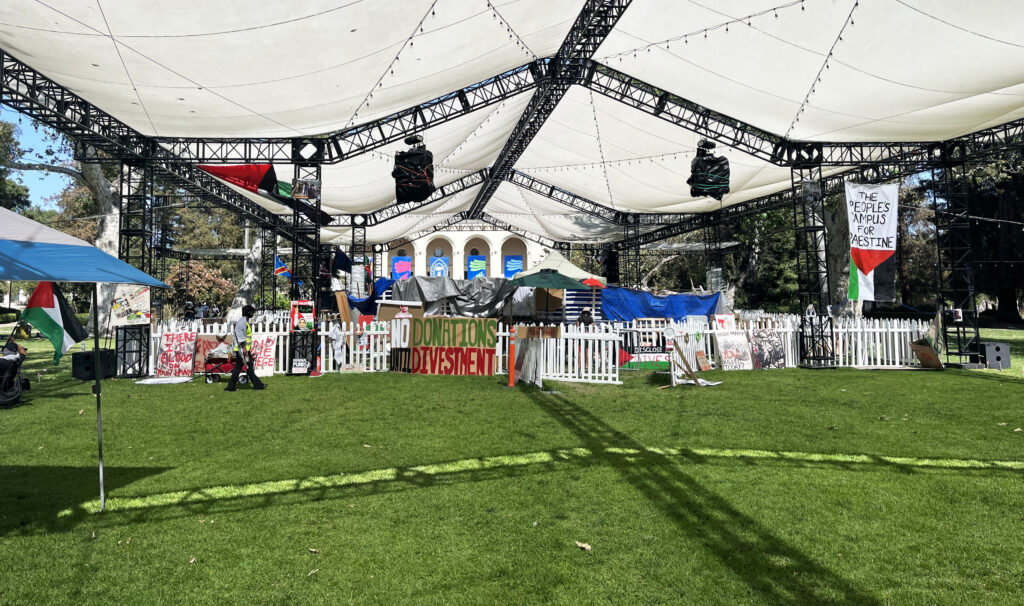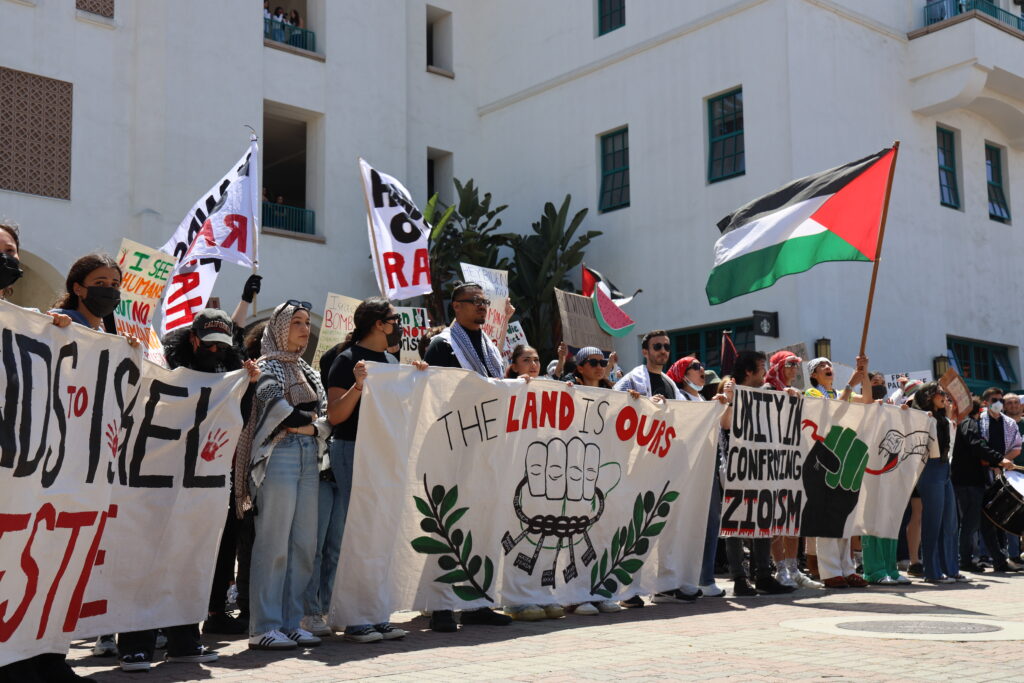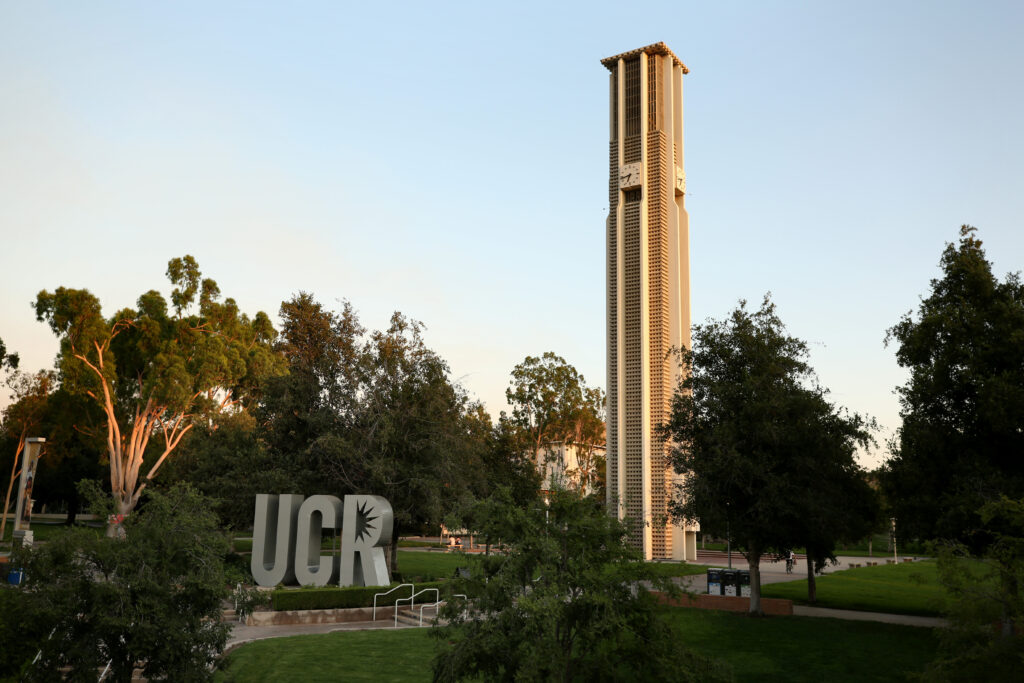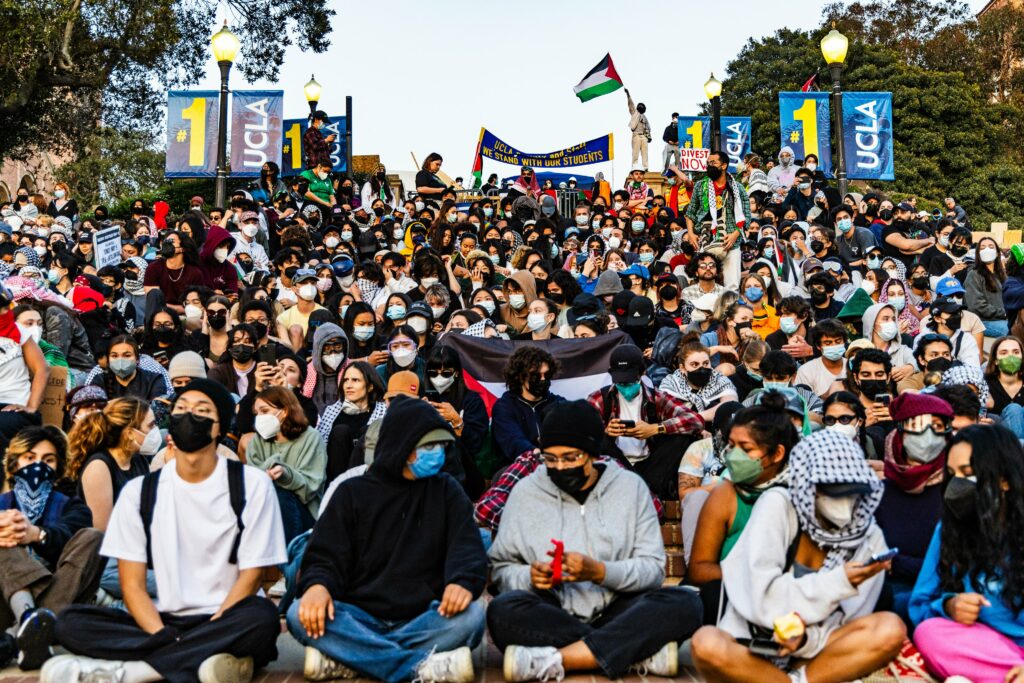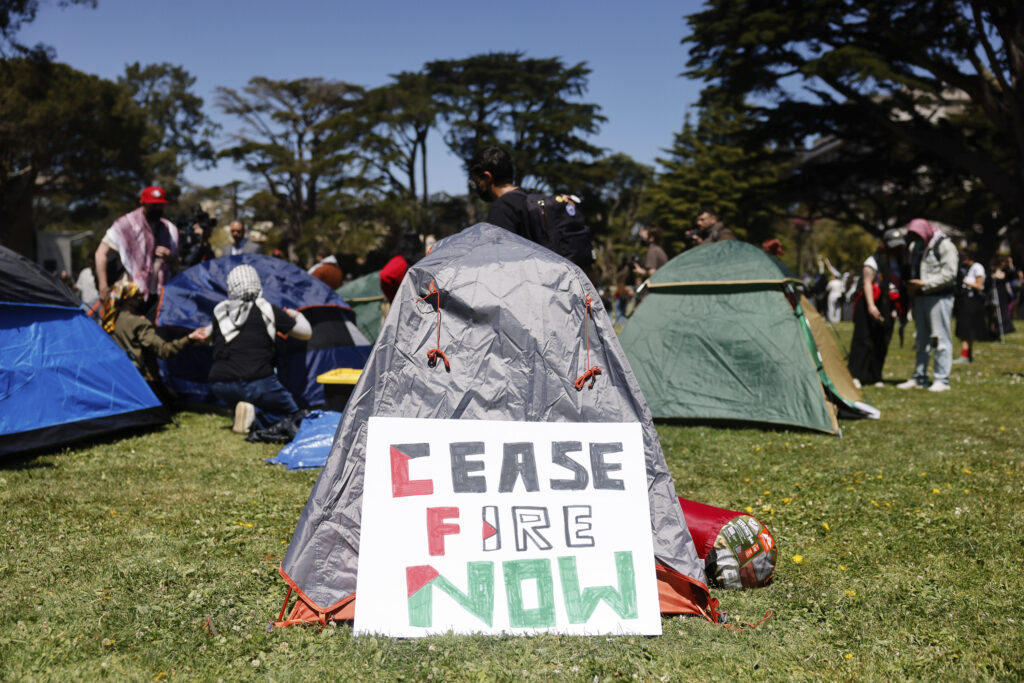
Pro-Palestinian encampment encroaches on the stage and grass area where commencement is planned for Sunday at Pomona College.
Credit: Michael Burke / EdSource
At Pomona College in eastern Los Angeles County, commencement ceremonies are scheduled to take place this weekend on the college’s central Marston Quad, with events planned Friday through Sunday.
But as of late Thursday, a pro-Palestinian encampment on the quad was growing in the exact location where commencement is supposed to be held. Dozens of students have set up tents, Palestinian flags and barricades around the college’s graduation stage, making it unclear whether the college will be able to proceed with commencement activities.
Protesters said Thursday that they have no plans to leave the encampment until the college meets their demands to divest its endowment funds from companies supporting Israel and its war in Gaza.
“These schools love their pageantry and their ceremonies, so seizing the commencement plaza was really just a strategic move to show the college that we will continue to disrupt business as usual until they divest,” said Kwame Nkrumah, a sophomore at the college studying political sociology.
The elite liberal arts college of about 1,700 students is one of several campuses across California with commencement events scheduled this weekend that could be disrupted by protests.
The University of Southern California canceled its main stage commencement ceremony altogether, citing security concerns. It does have other events planned, including a celebration for graduating students and their families at the Los Angeles Memorial Coliseum that was held Thursday night.
At UC Berkeley, which will hold its main ceremony Saturday morning, campus officials acknowledge protests are possible but say they are moving ahead with commencement like business as usual.
They are some of the first graduations to be held since pro-Palestinian encampments and protests popped up last month across California and the rest of the country, sparked by the arrests of more than 100 protesters at Columbia University on April 18. Protesters have demanded their campuses divest from Israel. Protesters at one campus in California declared success earlier this week, when Sacramento State changed its investment policy to state that the college will no longer invest “in corporations and funds that profit from genocide, ethnic cleansing, and activities that violate fundamental human rights.”
At Pomona, campus officials say they remain committed to holding their commencement events this weekend. The first event scheduled to take place on the quad is Friday at 5 p.m., when the college plans to hold an induction for its chapter of Phi Beta Kappa, an honor society. On Saturday evening, the college plans to hold a celebratory dinner on the quad for graduates and their families before the main commencement ceremony on Sunday morning.
“Throughout the year, college leaders have offered to meet with student protesters and will continue to do so. We will promote safety for all members of our community and pursue our educational mission, considering the full range of viewpoints. We are committed to holding Commencement to honor the Class of 2024, with their loved ones, and preparations are continuing,” a college spokesperson said in a statement to EdSource.
College officials, who were not made available for an interview, have not disclosed how or whether they plan to clear the encampment in order to hold the commencement activities. Nkrumah said students are prepared for the possibility that police will attempt to clear the encampment. Last month, 20 students were arrested while occupying the college president’s office.
Mattin Khoshzaban, a graduating senior at Pomona, said he and his classmates have heard little from administrators ahead of this weekend’s ceremonies. Khoshzaban said he supports the protesters and their message but added he’s frustrated by the possibility that commencement could be disrupted. Like many current college seniors, he graduated from high school in 2020 and didn’t get an in-person graduation ceremony because of the Covid-19 pandemic.
“Although they’re trying to protest the administration, it feels like a protest against the students. And especially because we didn’t get our first graduation,” he said. “We have our families flying in. We literally don’t know what’s going to happen.”
Khoshzaban, who is studying economics, has a dozen family members who were expected to fly into the Los Angeles area starting Thursday night from Oregon, including his parents, grandparents, siblings and even aunts and uncles.
“My family has protested other things at different times, but they are upset for me because they know I didn’t have a high school graduation,” said Khoshzaban, who added that it would be “very meaningful” for him to be able to walk across the commencement stage.
Anwar Mohamed, another graduating senior, feels differently. He also had his high school graduation in Chicago canceled because of the pandemic, but he isn’t worried about whether he walks across the stage.
Demanding that Pomona divest is a personal issue for Mohamed, who is one of the organizers of the encampment. Mohamed, who is Muslim, said he remembers his family talking about Palestine since he was just 3 years old.
“Every time we were in Friday prayer, it was always like our prayers are to Palestine. Like our actions are to Palestine, our beings are for Palestine,” he said. “And I think for me as a senior, it’s realizing that I didn’t come here for walking across a stage. College was never about this degree. College was about doing this study and understanding the material world that we live in.”
Farther north in California, at UC Berkeley, planning for commencement is proceeding normally and will be held Saturday morning at California Memorial Stadium. College officials are not ruling out the possibility of protests but say there are no plans to change any of the usual commencement programming.
“Berkeley graduation ceremonies have been venues for all sorts of protests for many years. This year, like every year in the past, our efforts will focus on ensuring the ceremony can be successfully held, and on supporting the ability of graduating students, their friends, and families to safely enjoy and take part in an incredibly meaningful day,” said Dan Mogulof, a spokesperson for the campus.
Christopher Ying, a graduating senior at UC Berkeley, said he appreciates that Berkeley is moving ahead with a typical commencement. Ying is this year’s recipient of the University Medal, Berkeley’s top honor for graduating seniors, and will give a speech at the ceremony. He received the honor in part for his work with incarcerated people, including tutoring them and helping them edit and publish news stories that were distributed at prisons statewide.
Ying doesn’t plan to address Israel’s war in Gaza during his speech, saying that it wouldn’t be genuine to talk about it because none of his extracurriculars while in college related to the conflict. But he added that the university never told him he couldn’t talk about the conflict in his speech.
Meanwhile, at the University of Southern California, college officials canceled the commencement speech of valedictorian Asna Tabassum before canceling the ceremony altogether. Tabassum had been attacked by pro-Israel groups over a link in her Instagram bio that led to a website supporting Palestine.
“I’m glad that Berkeley is not going down that same path. Berkeley obviously has a very rich history of having been involved with the free speech movement,” Ying said.
